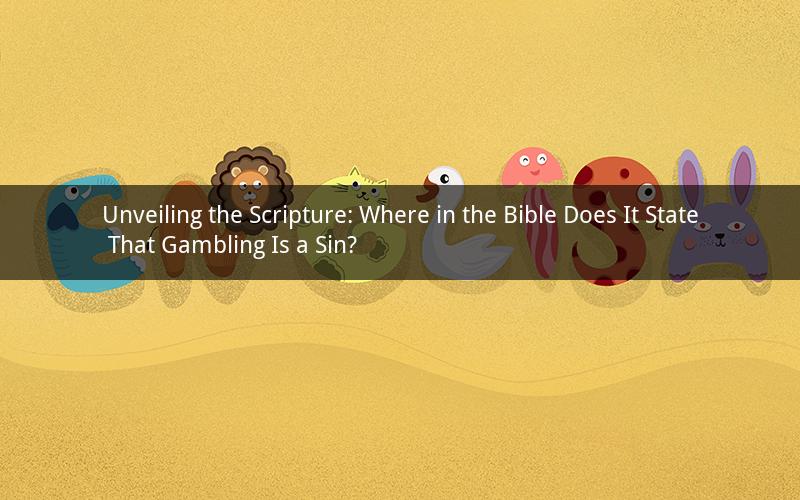
In the vast and profound teachings of the Bible, various topics have been discussed and debated for centuries. One of the most debated subjects revolves around gambling, and many people are curious to know where in the Bible it is explicitly stated that gambling is a sin. This article delves into this topic, examining the relevant scriptures and providing insight into the Christian perspective on gambling.
Where Does the Bible Speak of Gambling as a Sin?
The Bible does not explicitly mention the word "gambling," but there are several verses that address activities similar to gambling and warn against them. The main passages that Christians often cite when discussing the sinfulness of gambling include:
1. Proverbs 13:11: "Dishonest money dwindles away, but he who gathers money little by little makes it grow."
This verse can be interpreted to mean that dishonest means, such as gambling, can lead to financial ruin and loss, emphasizing the importance of integrity and hard work in achieving wealth.
2. Proverbs 28:20: "A faithful man will be richly blessed, but one eager to get rich will not go unpunished."
This verse suggests that those who seek wealth through dishonest means, including gambling, may face divine consequences for their actions.
3. Colossians 3:5: "So put to death the parts of you that are earthly: sexual immorality, impurity, lust, evil desires, and greed, which is idolatry."
While this verse does not directly mention gambling, it highlights the broader concept of greed and the desire for material wealth, which can be associated with gambling.
Is Gambling Always Considered a Sin in the Christian Perspective?
While many Christians believe that gambling is a sin based on the aforementioned scriptures, it is essential to note that the Bible does not explicitly label gambling as such. Some Christians argue that gambling can be permissible if done responsibly and without the intention of deception or greed. Others believe that any form of gambling, regardless of the context, is inherently wrong.
5 Questions About the Bible and Gambling:
1. Can a Christian play casino games or participate in lottery draws if they do so responsibly and with no intention of deception?
Answer: Many Christians would argue that playing casino games or participating in lottery draws can be permissible as long as it is done responsibly, without the intention of deception, and within legal boundaries. However, others may believe that the potential for greed and addiction makes these activities inherently wrong.
2. What role does chance play in determining whether gambling is considered a sin?
Answer: Some Christians believe that the element of chance involved in gambling makes it a form of chance-taking that is incompatible with faith, while others argue that the sin lies in the intention behind the gambling rather than the act itself.
3. How can one differentiate between a permissible form of gambling and an impermissible form?
Answer: The key to differentiating between permissible and impermissible gambling lies in the intentions behind the act and the potential for harm. Permissible gambling would be done responsibly, with no intention of deception, and within legal boundaries. Impermissible gambling would involve greed, deception, or the potential for addiction.
4. Are there any exceptions to the rule that gambling is a sin?
Answer: While the Bible does not explicitly mention exceptions, some Christians argue that there may be instances where gambling can be permissible, such as in friendly, non-gambling card games among family or friends.
5. How can one stay faithful to their Christian beliefs while participating in gambling activities?
Answer: Staying faithful to Christian beliefs while participating in gambling activities requires a strong sense of self-discipline, integrity, and a deep understanding of the Bible's teachings on wealth, greed, and responsibility. It is crucial to assess personal motivations and the potential risks involved before engaging in any form of gambling.
In conclusion, the Bible does not explicitly state that gambling is a sin, but several verses address the potential dangers associated with dishonest means and the desire for wealth. The Christian perspective on gambling is varied, with some believing it to be inherently wrong and others considering it permissible in certain circumstances. As with all moral issues, individuals are encouraged to seek wisdom, guidance, and discernment from their faith leaders and the Bible itself.